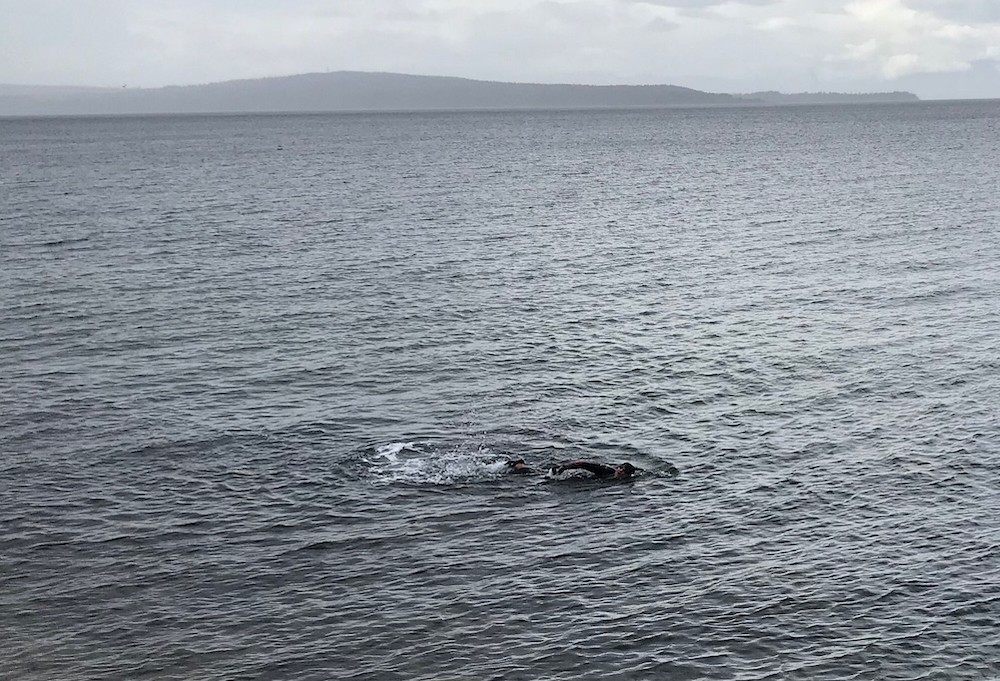Jump. Jump! It’s mid-September, and the Comox–Powell River ferry is lumbering across the Salish Sea, taking my family home after a vacation.
I’m anxious that my preschooler, who is singing Beyoncé to passersby, might slip on the deck and slide under the railing, tumbling into the deep blue ocean below.
Kill yourself. Simultaneously, my inner monologue is suggesting that now would be a good time to die.

Less than a week later, I participate in a casual triathlon organized by a friend of a friend. It begins with an open-water swim off Diver’s Rock in Lund, B.C. The water is cold. Surprisingly cold. Up ahead, two men I just met are front-crawling towards the rock that marks the halfway point of our swim. Charlie and Aaron are both wearing wetsuits, as are Lauren and Emily, the two women I’m keeping pace with. I am in a long-sleeved swimsuit. My limbs feel heavier, moving more slowly in the cold.
On the way out to the halfway rock, we’re chatty. A support canoe flanks us. I’ve never been to this part of the northern Sunshine Coast, and I ogle the vacation houses perched on the rocky cliffs above the ocean.
On the way back, we’re quieter: the current is with us, but the wind is not, and I slice through the waves by side-stroking for as long as I can stand to have my bare head in the water. Every few minutes, a wave manages to hit me directly in the face, and I’m shocked again — I grew up in a landlocked place, with lakes — at just how salty the ocean really is. As salty as a pot of pasta water.
When we get out, we’ve swam 1,500 metres, and it’s time to get on our bikes. Our muscles are fatigued, like we’ve biked a leg of our race already. Another one of the ocean’s gifts: gentle exhaustion. My muscles are sore, but the bones and ligaments I irritate when I jog, or sometimes even when I bike, are not.
I’m afraid of dying. Last December, realizing my mental health was reaching a precarious point, I got a referral from my doctor to the local addictions and mental health clinic at the hospital. Instead of sleeping at night, I was doing simultaneous calculations of how much life I might have left, and what could end it sooner. I was picturing every traumatic thing I’d ever witnessed, as if my brain had saved them on a photo carousel for the occasion. And one of my more shameful anxiety-related habits, one I’m not even comfortable sharing here, had intensified to an embarrassing point.
These are details I don’t usually share with people. I’m bipolar, I explain. Or, I have generalized anxiety disorder. I was diagnosed with depression at eight. I’ve put myself in the hands of state-run psychiatric care options in several provinces across Canada, including Ontario, Quebec and British Columbia. Drugs have helped, but their side effects make them unappealing in all but the direst of circumstances. Counselling has taken the edge off, but it’s never really fixed anything.
In August, as part of a reporting trip, I biked 80 kilometres down the eastern coast of Vancouver Island, from Comox, B.C., to the passenger ferry that took me to Lasqueti Island. That night, I discovered that my anxiety symptoms were basically gone. The steady thrum of intrusive thoughts had lessened to a trickle. And the endorphins I’d gotten from cycling that distance had ebbed into a smooth, calm feeling of contentedness. It was a revelation, but one that came with frustration: I’d been walking 45 minutes a day after my preschooler was in bed every night for months, and walking hadn’t made a dent in improving my mood. Where was I supposed to find the time for three or four hours of moderate-intensity exercise on a regular basis, if that was the trick to improving my mental health?
Since August, I’ve been running three times a week and lifting weights three times a week, cycling regularly, and swimming in the ocean on Sundays. It’s not a daily three hours, but it’s a lot. And it’s working. I like to sweat. I enjoy being slightly out of breath. I revel in muscle soreness. I appreciate every moment of my workout that is no thoughts, just movement.
But the most meaningful plank of this routine has been cold ocean swimming. I bought a swimming wetsuit, and a little neoprene cap, and booties. When I wade into the water, feeling the cut of mollusk shells against the booties, it feels at first as though I’ve fully sealed myself off from the water. Then the ocean begins to seep in, forming a thin layer between my body and the suit.
I swim with friends, mostly, but if they’re busy, I swim alone, my partner and kid on the shore to keep me company. When I’m alone in the water, I front-crawl, wearing goggles so I can catch a glimpse of what surrounds me: moon jellies, bladderwrack, eel grass.
I’m strong, and naturally buoyant — but I’m also terrified. The ocean draws me, and thrills me, but I often get a shot of anxiety when I see or feel something I don’t recognize. I have, occasionally, had panic attacks while swimming in lakes and oceans. But as soon as I get out, I am thinking about the next time I’ll be able to get back in.
And getting back in — it defies the voice in my head telling me to jump. It says I can wade and float and swim, safely, without dying or fearing death or wanting to die. I can go directly to the place that frightens me, and I can survive.
The last swim I take while writing this essay is in mid-December. My friend has to cancel at the last minute, so it’s just me. Which is fitting, in some ways — depression is lonely, and sometimes, the only way to tackle the loneliness is to face it head on.
The ambient temperature is about 3 C, and the ocean temperature is about 7.5. The ocean is calm, and the sky is grey and cloudy, but it’s not raining.
There is burgeoning research about why cold dips might be good for our mental and physical health — potentially reducing inflammation as well as the body’s stress responses. And maybe this is why I’ve been drawn to fall and winter swims — why I’ve kept on even as my swimming buddies have mostly taken a well-deserved pause as the ocean temps dropped into single digits.
I’m feeling better than I did last December. I’m feeling better than I did this past August. Even as the days have grown short, even as my general energy levels have gone into a winter slump.
Because I’m alone, I walk to Willingdon Beach, where the entry into the water is sandier, and I know the terrain from frequent summer swims — where the barnacle-and-oyster-encrusted rocks give way to sand, and then to seagrass and kelp.
It’s the first time I zip myself into my wetsuit without help, tugging on the cord of the zipper that runs from my lower back to the nape of my neck.
As I enter the water, the water enters the wetsuit. It’s a cold that is gently bracing, thanks to all the neoprene — the booties, the wetsuit, the fingerless gloves, the dorky swimming cap with its Velcro strap meeting under my chin. It’s most intense on my bare face, and on my hands.
Instead of front-crawling, I mostly do a sort of amended breaststroke, slow and steady. I pull my goggles on to take a quick look into the water. And to dunk my face in. My breath turns into little puffs of dragon smoke curling off the rippling slate-blue water.
In September, when the ocean temperature was more like 15 or 16 C, my friends and I would swim about 1,500 metres. Today, I walk 1,500 metres to the beach — and then swim a slow, easy 300.
When it’s this chilly, the swim is less about the cardio than the ritual of carrying on the practice through the year’s coldest, darkest months.
This is one of a series of essays on the meaning of winter. Judith Sayers will finish the set later this week. The first two are here:
Winter Is for Regeneration. The Garden’s — and Yours, Too
When It’s Cold and Dark, Memories of Faith Can Warm
Happy holidays, readers. Our comment threads will be closed until Jan. 3 to give our moderators a break. See you in 2022! ![]()
Read more: Health















